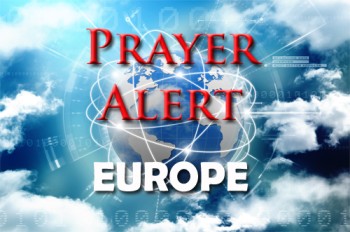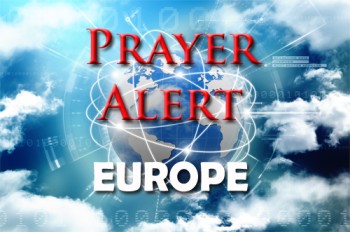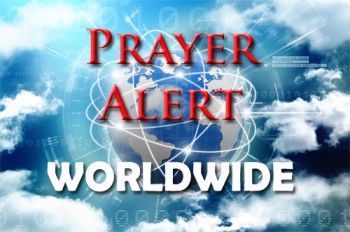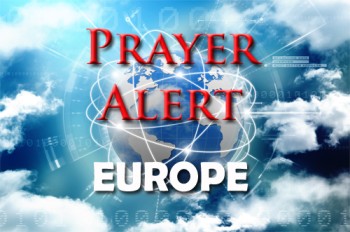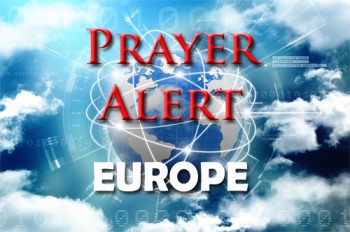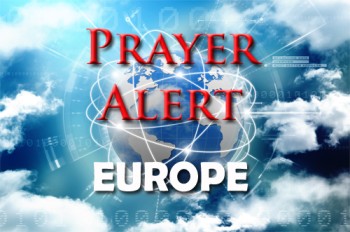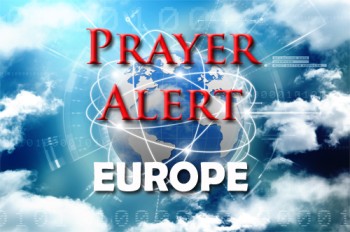Displaying items by tag: Europe
Operation Blessing
Over 2.5 million Ukrainians have now found refuge in Poland, and the number just keeps rising. Even on a rainy day, the border crossing is crowded with war-weary refugees searching for some relief. Denys, a 40-year-old single dad, fled Kharkiv after living in his basement for a month. He's been raising his son alone since his wife died 18 months ago. He arrived at the Operation Blessing tent cold, wet, and hungry, but left full and dry, with a new coat and a suitcase for his belongings. Nearby, a crying baby is now smiling and content after being rocked to sleep by a volunteer. The sounds of war gave Marina’s three young sons nightmares, so she fled leaving behind an older son and husband to defend her homeland. Oksana, Denys, and Marina are so thankful that Operation Blessing was there in their time of need to help and pray with them.
Russia: Putin’s health and blunders
It is well known that Vladimir Putin has had back surgery more than once. He has cultivated a strong action-man image and does not want to appear weak or sick. However, there is talk of Parkinson’s, based on his recent twitches and shaking. An American magazine has released a recorded interview of an unnamed oligarch saying he had to have treatment for blood cancer shortly before ordering the Ukraine invasion. There is evidence of repeated visits by a senior cancer specialist, and a video is being circulated showing him shaking. He appeared frail at Victory Day celebrations, with speculation he is ill with something serious. His erratic, impatient behaviour lately could account for Russia’s many military blunders. It is believed that Moscow has lost a third of its ground forces; there are critical shortages of bridging equipment and surveillance drones, plus increasingly low morale.
Ukraine: war crime investigations
The International Criminal Court (ICC) has sent 42 experts to probe alleged war crimes since Russia’s invasion of Ukraine. The team of investigators, forensic experts and support staff will improve the gathering of witness testimony and the identification of forensic materials, and help ensure that evidence is collected in a manner that strengthens its admissibility in future proceedings. The court is based in the Netherlands and a significant number of Dutch national experts will help the mission, working together with French forensic experts who are already in Ukraine. The work of all those involved in the conflict area must be effectively coordinated. The ICC prosecutor said alleged war crimes and crimes against humanity turned Ukraine into a crime scene just four days after the 24 February Russian invasion. In the first trial of its kind since the war began, a Russian soldier has admitted killing an elderly Ukrainian civilian. If convicted, he faces up to life imprisonment: see
Pipeline awaits approval
The EU is finding it difficult to decrease its dependence on Russian oil and gas. One alternative is the proposed EastMed pipeline, which would carry natural gas extracted from fields under the waters of Israel's and Cyprus's exclusive economic zones to Greece and from there to other European countries. The pre-feasibility studies of the pipeline, conducted from 2015-18 and paid for by the EU, found that the project is ‘technically feasible, economically viable and commercially competitive’. The US under secretary of state for political affairs, meeting with her counterparts in Turkey, has said that more pipelines are needed in the Eastern Mediterranean. However, the USA prefers to steer business to Turkey rather than to America's democratic allies, Cyprus, Israel and Greece. Algerian gas pipelines are also acceptable to the Americans, but the long-planned EastMed pipeline is not.
Russian missionary pastor in Ukraine
Pastor Denis, a Russian with an Odessa-based YouTube channel, says, ‘I believe the situation in Ukraine will shake the false foundations of many people’s lives and they will turn to God, who is the Rock of our salvation and who is a strong tower.’ Dodging rockets, Pastor Denis and his congregation are in the streets telling people about Jesus.He says, ‘When we can, we keep witnessing to people, we keep evangelising, unless incoming missiles ruin our plans. We continue to hold church services unless curfews make us stream them.’ Not every Russian supports Putin’s imperialistic designs against neighbouring Ukraine, especially those living outside Russia who have access to western media sources. Pastor Denis believes that the malevolent war against neighbouring Ukraine will lead to revival.
Black Sea becomes a war front
Ukrainian military officials said on 7 May that they had sunk another Russian warship in the Black Sea. The ship was a craft designed to transport and deploy troops to the shore. The strike was executed with Turkish drones, which Ukraine has relied on during the war. Just weeks after the Russian flagship Moskva missile cruiser was hit by Ukraine’s missiles and sunk, this Russian warship was left burning in the Black Sea. A reliable naval source verified that a Ukrainian Neptune anti-ship missile struck the vessel, with a large number of Russian aircraft circling overhead. Russia’s fleet is shrinking. See also
Russia’s and Ukraine’s mission fields
Christian missionaries in Russia have been referred to as ‘volunteers’ since 2016 after a law was passed that limits religious proselytising. Ukraine has become a launching pad for missionaries to Russia, where there is little or no religious freedom. A Ukrainian missionary wrote recently, ‘Our church has formed a team to help with the different aspects of receiving refugees, among other related activities. On 1 March I went to a military installation in Chișinău, where refugee Indian medical students from Odessa were sheltering. Some students were thankful to see a pastor and pray with him. They have studied medicine in Odessa for six years, and had just two months to complete graduation when the war came and they had to leave. They want the war to end soon, and they can return to Ukraine to complete their studies.’
Russia trying to encircle Ukraine's east
Russia has removed forces from areas near Kyiv and is focusing on eastern Ukraine. The battle for Ukraine's old industrial heartland known as Donbas is likely to decide the fate of the Russian invasion. Pray for Ukraine and its allies to prevent Russia annexing Donbas and adjacent areas and claiming the territory as Putin did with Crimea in 2014. Russia’s attacks on the south have triggered a humanitarian catastrophe at the siege of Mariupol. Pray for Ukraine’s ‘best-trained forces’, already there due to the eight-year war with Russian separatists, to hold on to the land. Much of Donetsk and key areas of Luhansk are still in Ukrainian hands The Institute for the Study of War (ISW) says if Ukraine holds on to Slovyansk, Russia's campaign to seize both regions ‘will likely fail’. We can ask God to enable this scenario.
EU ban on Russian energy
EU countries rely on energy from Russia more than any other nations. Now, after weeks of speculation about how far the bloc would go in imposing economic sanctions that could harm its own member states, Ursula von der Leyen announced, ‘Today we propose to ban all Russian oil from Europe.’ The ban would hit the pillar of Russia's economy by phasing out imports of Russian crude oil to Europe within six months and stopping the flow of refined oil by year's end. It would put enormous pressure on the EU's 27 members to find new energy sources and cope with whatever retaliatory moves Russia imposes in return. Even though the EU relies on Russia more than others to fulfil their energy needs, we can pray for the bloc to support Ukraine and end all funding of Russia's war machine. Pray also for EU citizens to accept the inevitable price rises and potential fuel shortages.
Russia: talking about a nuclear apocalypse
Vladimir Putin has ominously warned if any country intervenes in Ukraine, Russia will respond with instruments others don’t have. Russian media has been hyping the same rhetoric, bombarding audiences with declarations that World War III is imminent. Every major channel is promoting the idea of an inevitable, never-before-seen war between the Kremlin and the collective West. The ministry of foreign affairs delivered a 60-minute Orwellian broadcast saying that this is not about Ukraine, but about the future world order, which has no room for Russia’s isolation. Recently a TV presenter said, ‘it’s probable everything will end with a nuclear strike; we will go to heaven, while they simply croak. We’re all going to die some day.’ Patriotic citizens are being groomed with the idea that dying for the motherland will skyrocket them to paradise.

